Featured Stories
Hispanic Heritage Month Feature: Meet Downstate’s Dr. Samuel Márquez
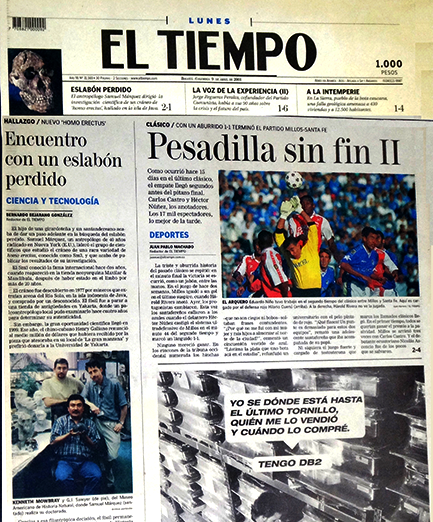
September 15th marked the first day of Hispanic Heritage Month—a national commemoration of the influence and contributions of Latino communities
to American history, culture and values since this country’s founding. As one of the
most diverse and inclusive institutions for higher learning—Downstate is home to some
of the most prominent and noteworthy Hispanic scholars, faculty, and thought leaders
across the health professions.
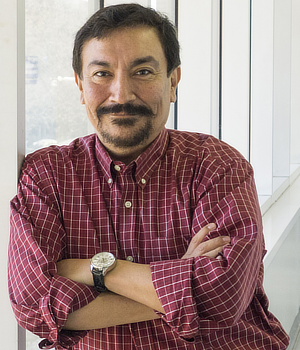
In celebration of this significant month, I’d like to provide one of many incredible
examples of the work and contributions to the health sciences from Downstate’s Hispanic
community—starting with, Samuel Márquez, Ph.D., Professor in the Department of Cell Biology, Co-Discipline Director of Anatomy
in the College of Medicine, and the Director of Anatomy of School of Health Professions.
Some of you may recall Dr. Márquez from one of his most recent splashes in the media
after he published his study in The Anatomical Record, “Reconstructing the Neanderthal Eustachian Tube: New Insights on Disease Susceptibility,
Fitness Cost, and Extinction” which suggested that the real perpetrator in the extinction of the Neanderthals was
not some exotic virus, but rather the most common of childhood illnesses–ear infections.
Still Dr. Márquez’s academic and professional contributions stretch much farther than
his time here at Downstate.
A first-generation Colombian-American and a Bronx native, Dr. Márquez pursued his
undergraduate studies at Lehman College and later went on to earn his doctorate in
Physical Anthropology at the City University of New York, while under the tutelage
of Mount Sinai School of Medicine’s, Dr. Jeffrey Laitman.
Today, Dr. Márquez is a renowned functional craniofacial comparative anatomist whose
work has been rooted in traditional gross anatomic dissection, morphometrics of dry
skulls, and CT & MR imaging to understand the diversity across living human populations.
His groundbreaking studies—steeped primarily in paranasal sinus-related scientific research—has been published in countless journals, his discoveries have made headline news
globally, and his investigations have him allowed him to traverse the world. More
specifically, his work has lent itself to museums domestically, as well as internationally
in Central and South America, as well as Europe, to study the diversity in skull specimens
housed within their osteological collections. You can even find his work right here
in Manhattan’s American Museum of Natural History where he scanned a vast array of
crania housed in the Division of Anthropology and Mammalogy, as well as Egyptian mummies
from the predynastic era circa 3,600 B.C.E.

Equally as prominent, his expertise has been sought and featured in National Geographic, and his work following the unearthing of a Homo erectus calvaria from Indonesia
was highlighted on the Discovery Channel. Dr. Márquez and the team he assembled in 2001 later published three papers in The
Anatomical Record journal on the discovered fossil. Dr. Márquez's findings were covered
globally in the press, including The New York Times and NewsDay, El Tiempo and El
Colombiano from the cities of Bogota, and Cali in Colombia, South America.

While his passion for his profession is undeniable, Dr. Márquez is equally committed
to the advancement of the anatomical sciences—through education, research, and professional
development—which has been the primary focus of his academic portfolio. His committment
to working with and helping students from underserved populations reach and remain
interested in STEM has been unwavering. As the founder of Anatomy Education Day, he reaches hundreds of grade-school students and introduces them to the world of
science, helping to open their eyes and minds to the possibilities of their futures.
Additionally, after having presented novel educational methodologies and research
to the American Association of Anatomists (AAA) for years, Dr. Márquez’s passion
for teaching and research was recognized with the 2009 Basmajian Award. This honor
allowed him to extend the experience to his students, enabling in excess of 100 Downstate
scholars to present their anatomical research directly to the AAA —further developing
them via exposure to a professional society.
As if that wasn't enough, in 2015 he was elected to and is now the sitting Chair of
the Anatomical Committee for the Associated Medical Schools of New York (AMSNY).
Comprised of 19 medical schools in the State of New York, the AMSNY oversees the distribution
of anatomical material serving as an interface with legislative and regulatory State
agencies, providing a forum for discussion centering on curriculum and curricular
changes, and facilitating a platform for faculty recruitment and development. The
association also provides a forum for the advancement and promotion of junior faculty.
As chair, Dr. Márquez has appointed subcommittee teams to create outreach programs
for the anatomical sciences that aims at achieving exposure, motivation, and interest
in the sciences at the high school level by bringing the excitement of the discovery
process back into the classrooms while simultaneously addressing the pressing problems
of science illiteracy.
It is this caliber of work that continues to propel Dr. Márquez within his field while
continuing to develop his influence as a thought leader nationally, and simultaneously
adding to the legacy and scientific contributions that come from Downstate.
I’d like to thank Dr. Márquez for his professional passion, for his commitment to
our student body, his pursuit of excellence, and for being an undeniable pillar to
Downstate.
Josiah Macy Jr. Foundation Releases New Report on Addressing Harmful Bias in Healthcare
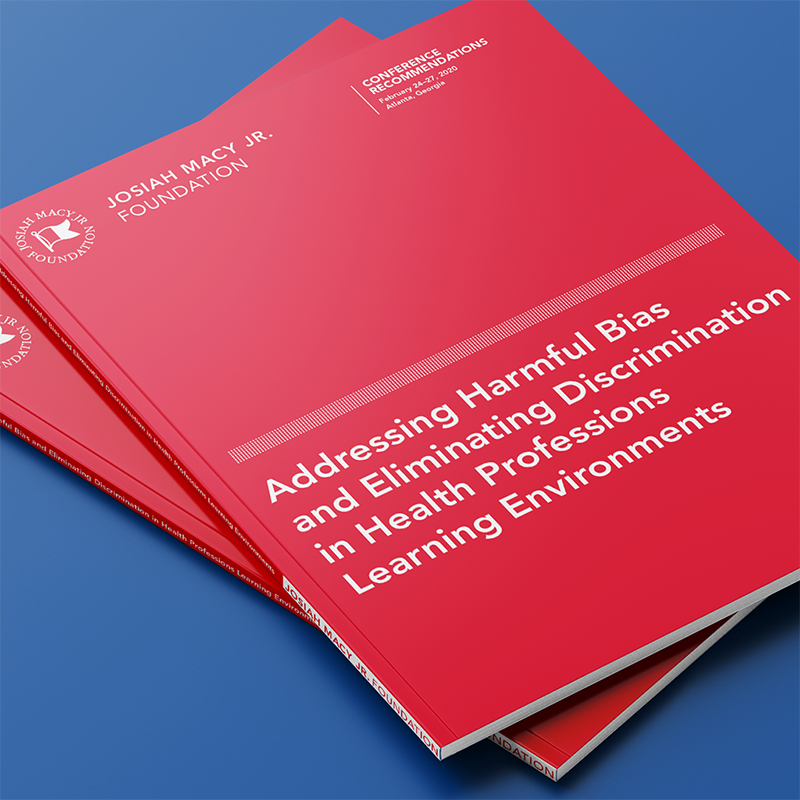
Founded in 1930 to memorialize the life of Josiah W. Macy Jr., the Josiah Macy Jr. Foundation was established as a philanthropic organization with the primary mission of supporting
medical research. Some 20-years later in the early 1950’s, the foundation evolved
and expanded its reach to greatly support and influence medical scholarship and education
as a pathway to improved health outcomes and to comprehensively improve the care provided
throughout our healthcare systems.
A couple of decades later, in the 1970s, the Foundation’s philanthropic work and grants
grew to become centralized around expanded and enhanced education for the broad spectrum
of health professions. Today, they remain the only national not-for-profit body, whose
mission is wholly committed to the advancement of professional health education—and
I am proud to share that they have remained resolute in advancing that mission.
Earlier this year in late February, the Foundation convened a national conference
for healthcare professionals on the issues of medical racism and reducing discrimination
throughout the health professions. The conference brought together healthcare leaders
and professionals from across the country who collaborated to produce guidance and
recommendations as a first step towards eliminating the discrimination in healthcare
that plagues the most vulnerable populations. I also had the distinct privilege of
lending my thoughts and voice to this critical conversation and, though it was unknown
at the time, that conference and the recommendations my peers and I put forth, could
not have come at a more relevant and opportune moment.
In response to glaring inequities in health outcomes underscored by the COVID-19 pandemic
and the ongoing national civil unrest regarding racial and social injustice, the Josiah
Macy Jr. Foundation published the recommendations from the conference, developed by
myself and my peers in healthcare, in their recent summary report: Addressing Harmful Bias and Eliminating Discrimination in Health Professions Learning
Environments.
This is only a first step in a series of ongoing events and actions that must occur
within the health professions before real change can manifest and before true equity
in the care provided to all Americans can exist. Still, I remain encouraged by the
great and meaningful efforts made by the Josiah Macy Jr. Foundation, humbled and honored
to have lent my support to this critically-important report, and steadfast in my belief
that change will come, so long as we all remain professionally unwavering in the path
forward.
Downstate Urology Resident, Arturo Holmes tells his story on ABC’s Nightline News!

As some of you may recall, this past summer, I shared how Arturo E. Holmes II, M.D., Downstate Urology Resident, opened up about his experiences with racial profiling
in a Washington Post opinion editorial entitled, I’m a Black Doctor. I Wear My Scrubs Everywhere, in which he discussed using his scrubs as a layer of protection from prejudice, hate,
and any potential harm that may come to him.
In the perspective piece, Dr. Holmes noted, “I wear scrubs and a mask when I’m shopping at the grocery store, rollerblading home
from work and even meeting up with friends, always seeking to preemptively exonerate
my blackness with my professional garb. It’s about protecting myself. Like many black
Americans, I’ve been followed by security personnel through department stores without
cause and pulled over by police officers at night for no reason.”
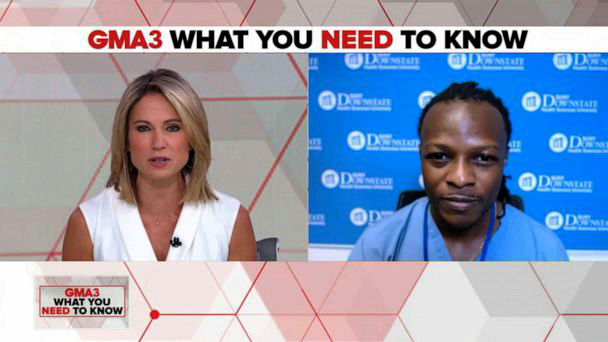
It was a line that resonated so deeply with audiences across cultures, it piqued the
interest of several networks for follow-up interviews with Dr. Holmes on his opinions
of the ongoing civil unrest around the country. Since then, Dr. Holmes has been on
an impressive press tour, including a live broadcast interview with Good Morning America’s Amy Robach and a profile interview with Byron Pitts of ABC’s Nightline News which aired on the
evening of September 10th.
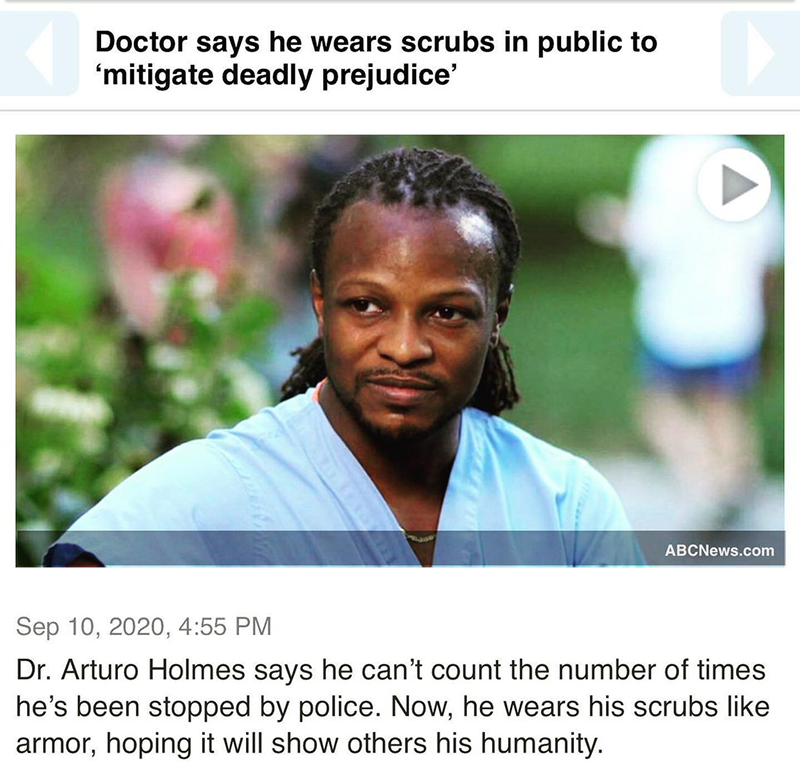
For those that missed the ABC Nightline News feature, please WATCH FULL VIDEO HERE!
Many thanks to Dr. Holmes for continuing to add to this critical dialogue and for
sharing a story that so many of us can relate to, and so many more can learn from.
|